 Petzlover
Petzlover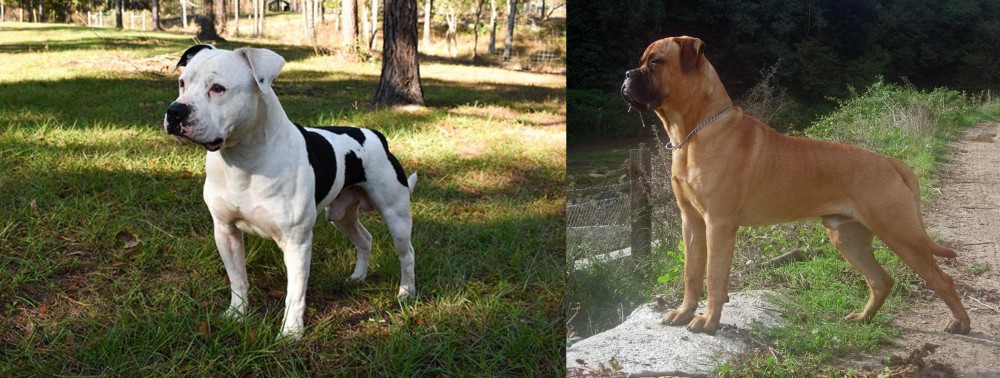 American Bulldog is originated from United States but Bullmastiff is originated from United Kingdom. Both American Bulldog and Bullmastiff are having almost same height. Both American Bulldog and Bullmastiff are having almost same weight. American Bulldog may live 4 years more than Bullmastiff. Both American Bulldog and Bullmastiff has almost same litter size. Both American Bulldog and Bullmastiff requires Low Maintenance.
American Bulldog is originated from United States but Bullmastiff is originated from United Kingdom. Both American Bulldog and Bullmastiff are having almost same height. Both American Bulldog and Bullmastiff are having almost same weight. American Bulldog may live 4 years more than Bullmastiff. Both American Bulldog and Bullmastiff has almost same litter size. Both American Bulldog and Bullmastiff requires Low Maintenance.
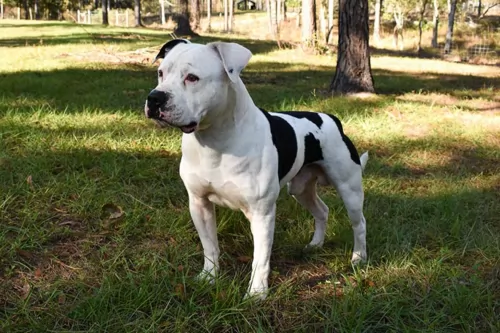 Following World War II, the American Bulldog was almost extinct.
Following World War II, the American Bulldog was almost extinct.
Thanks to John D. Johnson from Summerville, Georgia the breed is still with us today. He gathered the best dogs he could find throughout the rural South and bred them back into popularity among his family and other rural families. His father bred the American Bulldog before John did and they have bred them longer than any other in any part of the world. His dogs were regularly used for tracking, hunting, guarding, watchdog and weight pulling. At some point Alan Scott joined Johnson breeding other bulldogs to Johnson's and forming the Standard American Bulldog.
The American Bulldog/ is popular today as a family pet and companion as well as a working dog.
 The Old English Mastiff as well as the Bulldog are the breeds behind the Bull Mastiff. The Bullmastiff was originally developed in England around the 1860’s. Gamekeepers in England wanted a large, brave, robust dog which could help with keeping poachers away from their large estates which kept game.
The Old English Mastiff as well as the Bulldog are the breeds behind the Bull Mastiff. The Bullmastiff was originally developed in England around the 1860’s. Gamekeepers in England wanted a large, brave, robust dog which could help with keeping poachers away from their large estates which kept game.
As these large estates dwindled, so did the need for the services of the Bullmastiff and later they were simply bred to be family companions. As more Old English Mastiffs were bred, the dog became lighter, so that light tan or fawn became the preferred color.
The breed was officially recognized by the English Kennel Club in 1924, and the American Kennel Club in 1933.
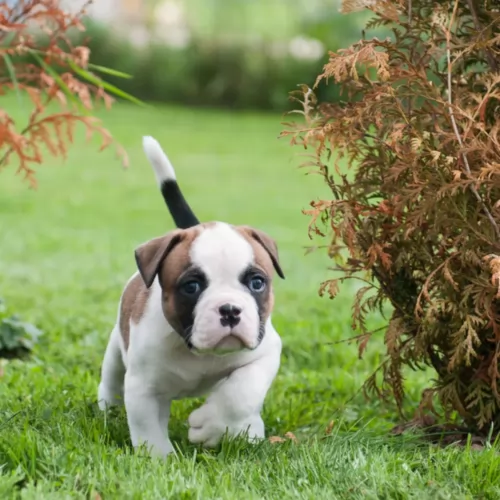 The American Bulldog is a powerful and muscular dog in a sturdy and compact frame. The female is more refined than the heavy boned and stocky male, but both genders are athletic, agile and quick. The have large heads, strong jaws, a muscular neck and with a moderately deep and wide chest.
The American Bulldog is a powerful and muscular dog in a sturdy and compact frame. The female is more refined than the heavy boned and stocky male, but both genders are athletic, agile and quick. The have large heads, strong jaws, a muscular neck and with a moderately deep and wide chest.
They have a square head, with muscular cheeks and a clearly defined furrow between his eyes. With broad, square and strong muzzles, they have a reverse scissors, scissors, moderate underbite and an even bite. Ears come in a variety of shapes and sizes and eyes can be any color as well. The nose however should be black and lips black as well. Their legs are strong, heavy boned and straight with well-defined muscles in the hindquarters. Finally ,they have a thick, low set tail that comes to a point at the end.
 Bullmastiffs are large, brachycephalic dogs, and heights are between 61 and 68cm and the dog weight anything between 41 – 59kg. While it isn’t particularly tall, the dog is thickly set with a deep chest and strong, muscular legs. The Bull Mastiff has a powerful build and plenty of strength with an imposing look on his face. He is a powerful, active breed with a short coat which is also weather resistant and can be any shade of fawn, red or brindle.
Bullmastiffs are large, brachycephalic dogs, and heights are between 61 and 68cm and the dog weight anything between 41 – 59kg. While it isn’t particularly tall, the dog is thickly set with a deep chest and strong, muscular legs. The Bull Mastiff has a powerful build and plenty of strength with an imposing look on his face. He is a powerful, active breed with a short coat which is also weather resistant and can be any shade of fawn, red or brindle.
The dog has a black muzzle and the skull is large and square. The ears are set high and are short and floppy. The tail was once docked, giving the dog an even more distinctive, powerful appearance, but these days, due to regulations, the tail is left long.
The Bullmastiff is a loyal, devoted, fearless, protective dog. When he belongs to a human family, he becomes a companion but a fierce protector too, being a territorial dog. They love being with their family and can be good with children too, and even other pets, but proper training and socialization will be important. They aren’t aggressive around strangers, though he does make a wonderful guard dog.
He is intelligent and stubborn and if you don’t want him becoming destructive, even though he is a low-energy dog, you will need to exercise him and walk him every day.
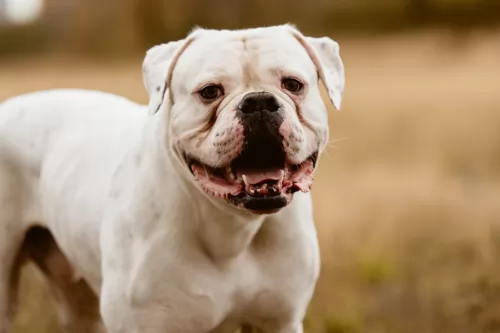 The American Bulldog is characteristically loyal, brave and reliable. It is a friendly, gentle dog that truly loves children. There is not a hostile bone in his body despite his history and reputation for bull baiting. Though he is protective of its family and affectionate with most, he still needs a human companion who is strong willed and a genuine pack leader. Without this he might become aggressive around other dogs and pets. They are immensely self-confident and they do slobber and drool and will become excited and hard to handle without daily exercise of both their body and their minds.
The American Bulldog is characteristically loyal, brave and reliable. It is a friendly, gentle dog that truly loves children. There is not a hostile bone in his body despite his history and reputation for bull baiting. Though he is protective of its family and affectionate with most, he still needs a human companion who is strong willed and a genuine pack leader. Without this he might become aggressive around other dogs and pets. They are immensely self-confident and they do slobber and drool and will become excited and hard to handle without daily exercise of both their body and their minds.
 Contrary to his formidable looks, the Bullmastiff is a gentle, affectionate pet when he has been properly socialized. He is a great pet for families and will guard them with his life. He is loyal and devoted but can be somewhat aloof, particularly with strangers.
Contrary to his formidable looks, the Bullmastiff is a gentle, affectionate pet when he has been properly socialized. He is a great pet for families and will guard them with his life. He is loyal and devoted but can be somewhat aloof, particularly with strangers.
He isn’t a highly energetic dog and he is more or less low maintenance and easy-going. Feed him correctly, give him a nice, warm sleeping spot to call his own and give him attention like he deserves as a family member. The Bullmastiff will reward you by being a solid and devoted companion.
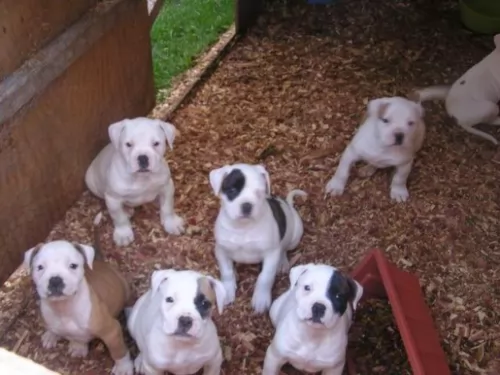 Though generally healthy, the American Bulldog is prone to a few problems.
Though generally healthy, the American Bulldog is prone to a few problems.
This is a serious issue in many breeds of dogs and is especially prevalent with the American Bull Dog. This may seem ironic in such a short legged dog but it is unfortunately very common. It is a genetic disorder that causes the bones in the joint to separate and causes the dog much pain and lameness.
Due to skin folds you need to be care and watch for irritation and infection in the folds. They are also prone to ear infections.
The American Bulldog is prone to overeating and all the health issues that presents. With short legs and a genetic predisposition to arthritis and hip dysplasia, obesity is a real health risk for your bulldog.
 The Bullmastiff is a generally healthy breed, but even so, the breed is known for having to contend with certain health issues. He doesn’t have a particularly long life span either and can live to be about 10, ll or 12 years of age. Some of the more common illnesses to look out for include -
The Bullmastiff is a generally healthy breed, but even so, the breed is known for having to contend with certain health issues. He doesn’t have a particularly long life span either and can live to be about 10, ll or 12 years of age. Some of the more common illnesses to look out for include -
This is a condition where the thighbone doesn’t fit properly into the hip joint. The troublesome part is that it can lead to arthritis, pain and lameness for your pet.
This is a worrisome, life-threatening condition for a dog, particularly for large, deep-chested dogs such as your Bullmastiff. Instead of feeding your Mastiff one large meal, it is recommended to feed him 2 smaller meals. Bloat occurs when the stomach is distended with gas or air and twists, restricting the normal return of blood to the heart.
 The Bullmastiff has a short dense coat which is looked upon as low-maintenance. He will require a brushing twice a week, being a light to average shedder. He is a dog that tends to drool quite a bit so you may need to wipe away slobber from time to time. Because his face has wrinkles, check the creases to ensure they remain free of dirt and food particles to ward off infection.
The Bullmastiff has a short dense coat which is looked upon as low-maintenance. He will require a brushing twice a week, being a light to average shedder. He is a dog that tends to drool quite a bit so you may need to wipe away slobber from time to time. Because his face has wrinkles, check the creases to ensure they remain free of dirt and food particles to ward off infection.
Check his ears at the same time, brush his teeth at least twice a week with special dog-toothpaste and brush and keep the nails trimmed.
Your large Bullmastiff will require high-quality commercial dog food but he will also need some home-made food in between such as rice, vegetables and meat. He is a large dog and will have to get an intake of raw meat too. Dogs denied raw meat can end up with skin problems as well as other health issues.It is better to feel your Bullmastiff smaller meals than to give him one large meal which he scoffs down quickly. Smaller meals will help prevent the most dangerous illness known as Bloat.
Ensure he has a steady supply of fresh, cool water.